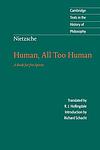The Greatest German "Nonfiction, Humanities" Books of All Time
Click to learn how this list is calculated.
This list represents a comprehensive and trusted collection of the greatest books. Developed through a specialized algorithm, it brings together 305 'best of' book lists to form a definitive guide to the world's most acclaimed books. For those interested in how these books are chosen, additional details can be found on the rankings page.
Genres
The category of "Humanities" in books encompasses a wide range of subjects that explore the human experience and expression. This includes literature, philosophy, history, art, music, religion, and language. These books aim to deepen our understanding of the world and ourselves, and to explore the complexities of human culture and society. Through the study of humanities, readers can gain insight into the past, present, and future of humanity, and develop a greater appreciation for the diversity of human thought and expression.
Countries
Date Range
Reading Statistics
Click the button below to see how many of these books you've read!
Download
If you're interested in downloading this list as a CSV file for use in a spreadsheet application, you can easily do so by clicking the button below. Please note that to ensure a manageable file size and faster download, the CSV will include details for only the first 500 books.
Download-
1. On the Genealogy of Morality by Friedrich Nietzsche
This philosophical work is a critical exploration of the origins and development of moral values. The author challenges conventional notions of good and evil, arguing that they evolved not from any inherent sense of justice, but rather as a means of exerting control over society. He presents a historical analysis of how morality has been used as a tool by the powerful to dominate the weak, and critiques the influence of religion and societal norms on our understanding of morality. The book is a profound examination of the nature of morality, its origins, and its impact on human behavior.
The 777th Greatest Book of All Time -
2. Studies in Iconology by Erwin Panofsky
"Studies in Iconology" is a seminal work in the field of art history that examines the use of allegory, symbol, and motif in visual art. The author uses a method known as iconology, which is the study of the content and meaning of works of art, as opposed to their form. By doing so, he provides a deeper understanding and interpretation of various artworks, particularly those from the Renaissance period. The book also delves into the cultural, historical, and psychological contexts in which these works were created, offering an in-depth exploration of the symbolism and significance of imagery in art.
The 3450th Greatest Book of All Time -
3. On War by Carl Von Clausewitz
This book is a comprehensive analysis of warfare, written by a Prussian military theorist. It discusses the philosophical aspects of war, such as its political nature and purpose, as well as its practical aspects, such as strategy and tactics. The author argues that war is an extension of politics by other means and that its ultimate objective is to compel the enemy to fulfill our will. He also introduces the concept of "friction" in war, which refers to the unpredictable factors that can affect the outcome of military operations.
The 3791st Greatest Book of All Time -
4. Human, All Too Human by Friedrich Nietzsche
This philosophical work delves into the human condition, exploring the nature of human emotions, cultural biases, and societal norms, while challenging traditional views of morality, truth, and freedom. The text examines the influence of religious and philosophical systems on human behavior, arguing that these systems often suppress individuality and creativity. The work also explores concepts such as the will to power and the eternal recurrence, ultimately promoting the idea of self-overcoming and the creation of new values.
The 3791st Greatest Book of All Time -
5. Epitome of Copernican Astronomy by Johannes Kepler
This book is a comprehensive exploration of the Copernican system of astronomy. The author delves into the theories and principles proposed by Nicolaus Copernicus, discussing the heliocentric model of the universe where the Sun, rather than the Earth, is at the center. The book includes detailed explanations and mathematical proofs supporting Copernicus's theories, making it a valuable resource for understanding the foundations of modern astronomy.
The 7960th Greatest Book of All Time
Reading Statistics
Click the button below to see how many of these books you've read!
Download
If you're interested in downloading this list as a CSV file for use in a spreadsheet application, you can easily do so by clicking the button below. Please note that to ensure a manageable file size and faster download, the CSV will include details for only the first 500 books.
Download



